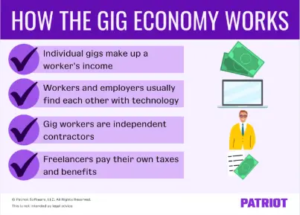Work From Home Jobs Are in Demand and Often Pay More – The landscape of work has undergone a seismic shift in recent years, driven largely by technological advancements and societal changes, notably catalyzed by the COVID-19 pandemic.
As businesses adapted to remote work models, the demand for work-from-home jobs surged, creating new opportunities for both employers and employees. This article explores the growing demand for remote jobs, the reasons behind their appeal, the types of roles available, and the financial benefits they can offer.
The Surge in Demand for Remote Jobs

A Changing Work Environment
The transition to remote work began in earnest in early 2020 when the pandemic forced many organizations to rethink their operational strategies. As companies scrambled to maintain productivity during lockdowns, they discovered that remote work could be a feasible and effective alternative to traditional office settings. According to various reports, including those from FlexJobs and CNBC, many companies have continued to embrace remote work long after the initial crisis, indicating a fundamental shift in workplace dynamics.
Flexibility and Work-Life Balance
One of the primary drivers of the demand for remote jobs is the flexibility they offer. Employees increasingly seek positions that allow for a better work-life balance, which remote work can provide. The ability to set one’s own hours, reduce commuting time, and work from a comfortable environment has become highly attractive. This flexibility not only enhances job satisfaction but also contributes to improved mental health and productivity.
Employer Adoption of Remote Work
Many employers have recognized the benefits of remote work as well. Reduced overhead costs associated with maintaining physical office spaces, access to a broader talent pool, and increased employee retention rates are compelling reasons for companies to continue offering remote positions. Organizations like Reddit, Airbnb, and many others have adopted remote-first policies, solidifying the notion that work-from-home options are not just a temporary solution but a sustainable model for the future.
Types of Work-From-Home Jobs
The range of remote job opportunities has expanded significantly, encompassing various industries and roles. Here’s a look at some of the most in-demand positions:
Technology and IT
The tech sector remains at the forefront of remote job offerings. Roles such as software developers, cybersecurity analysts, and IT support specialists are frequently available. According to a report from Virtual Vocations, many of the highest-paying remote jobs are found within the tech industry, with salaries often exceeding $100,000 annually. As companies continue to integrate technology into their operations, the demand for skilled tech professionals shows no signs of waning.
Customer Service and Sales
Remote customer service roles have also seen substantial growth. Companies like Liveops and other virtual call centers are actively hiring remote agents to handle customer inquiries and support. Sales positions, particularly in digital marketing and e-commerce, are thriving as businesses seek to reach consumers online. The flexibility of remote work allows sales teams to connect with clients across various time zones without the constraints of a traditional office setting.
Healthcare
The healthcare industry has adapted to remote work through telemedicine, where professionals such as nurses, medical coders, and transcriptionists can perform their duties from home. This shift has been particularly beneficial during the pandemic, allowing healthcare providers to maintain patient care while minimizing exposure risks. As telehealth continues to gain traction, the demand for remote healthcare jobs is expected to remain high.
Creative Professions
Creative roles, including graphic designers, writers, and marketers, have embraced remote work as well. The nature of these jobs often allows for flexibility in where and when work is completed. Many organizations are willing to pay a premium for skilled creatives who can contribute to their branding and marketing efforts from anywhere.
Financial Benefits of Remote Work
Higher Salaries and Reduced Costs
Interestingly, many remote jobs tend to pay more than their in-office counterparts. A report from She Works From Home highlights several high-paying remote careers, with salaries ranging from $50,000 to $150,000 per year. Factors contributing to higher pay include the competitive nature of remote roles and the broader talent pool that companies can draw from when hiring.
Additionally, remote work can lead to significant cost savings for employees. Without the need for daily commuting, individuals can save on transportation costs, work attire, and meals. These savings can contribute to a higher overall income, even if the salary appears similar to on-site positions.
Increased Opportunities for Advancement
Remote work also opens doors to new career advancement opportunities. With the rise of virtual networking and collaboration tools, employees can connect with leaders and peers from various locations, fostering professional relationships that may not have been possible in a traditional office environment. This can lead to increased visibility within an organization and greater opportunities for promotions and raises.
Counterarguments and Challenges of Remote Work
While the benefits of remote work are clear, it’s essential to acknowledge some challenges and counterarguments associated with this shift.
Isolation and Communication Issues
One of the most significant drawbacks of remote work is the potential for isolation. Employees may miss the social interactions and camaraderie of an office environment, leading to feelings of loneliness and disconnection. Communication can also suffer without in-person interactions, making it vital for companies to invest in effective virtual collaboration tools and practices.
Work-Life Balance Struggles
While remote work can enhance work-life balance, it can also blur the lines between professional and personal life. Some individuals find it challenging to “switch off” from work when their home is their office. Employers must recognize this challenge and encourage healthy boundaries to prevent burnout among remote employees.
Job Security and Stability
As remote positions become more popular, job security can be a concern. The flexibility of remote work means that companies may be more inclined to hire freelancers or contractors, leading to less stability for workers. This shift can create a gig economy mentality, where workers must continuously seek new opportunities to maintain their income.
Conclusion
The demand for work-from-home jobs is likely to continue growing as both employees and employers recognize the myriad benefits of remote work. With the right strategies in place to address the challenges associated with remote work, organizations can create a positive and productive environment that attracts top talent. For employees, the opportunity to work remotely often translates into higher salaries, better work-life balance, and increased career advancement opportunities.
As we move further into the digital age, the landscape of work will continue to evolve, and those who adapt to these changes will be well-positioned to thrive in the new world of employment. The future of work is here, and it is remote.






